TARTARE
Gherkin-like Mocha extension and reporter,
and testing tools library for Node.js
WHAT
Tartare is a BDD framework which
extends Mocha to use Gherkin syntax.
It also provides useful tools for testing.
WHY
By the time Tartare was born, BDD frameworks
for Node.js didn't fit our needs:
- Immature frameworks lacking key features (example tables)
- Not using Mocha behind the scenes (unit testing is being done with Mocha)
- Mocha itself use BDD but not Gherkin syntax
- Asynchronous code may mess up steps implementation (callback hell)
GHERKIN SYNTAX
New keywords
- feature
- scenario
- given
- when
- then
- and
New before/after hooks
- beforeAll
- afterAll
- beforeFeature
- afterFeature
- beforeEachScenario
- afterEachScenario
- beforeScenario
- afterScenario
- beforeEachVariant
- afterEachVariant
New reporters
Gherkin reporter for console
Coloured output adapted to Gherkin syntax
Real stats and metrics counting
features, scenarios, variants and steps
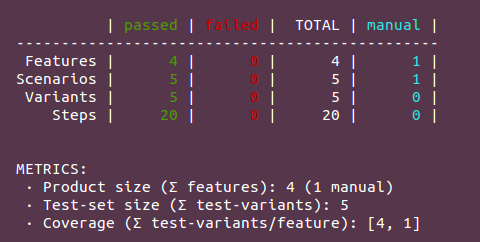
New reporters
Markdown Gherkin reporter
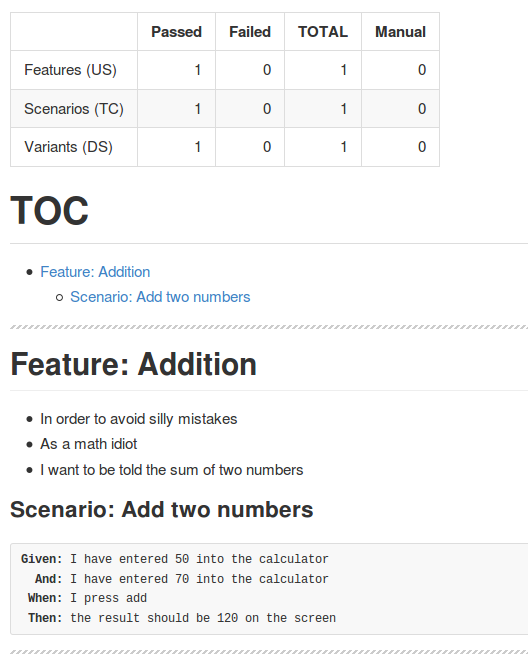
Using Tartare
On your code
var tartare = require('tartare');
Running tests
$ tartare --reporter gherkin --recursive ./acceptance
$ tartare --reporter gherkin-md --recursive ./acceptance
Features
feature('Addition',
'In order to avoid silly mistakes',
'As a math idiot',
'I want to be told the sum of two numbers',
function() {
});
Scenarios
feature('Addition', function() {
scenario('Add two numbers', function() {
});
});
Steps
feature('Addition', function() {
scenario('Add two numbers', function() {
given('I have entered 50 into the calculator', function() {
});
and('I have entered 70 into the calculator', function() {
});
when('I press add', function() {
});
then('the result should be 120 on the screen', function() {
});
});
});
Report output
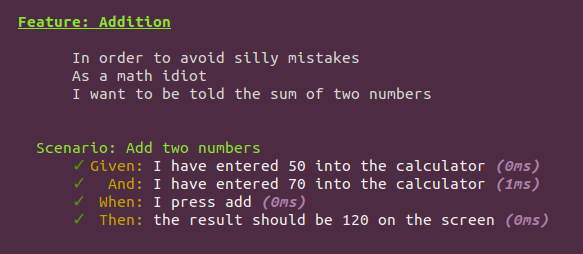
Manual
Features/Scenarios/Steps
feature('Multiplication', function() {
scenario('Multiply two numbers'); // This is a manual scenario
});
feature.manual('Addition', function() { // This is a manual feature
scenario('Add two numbers', function () { [...] });
});
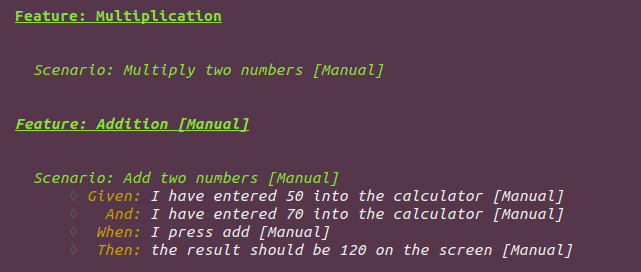
Skipped
Features/Scenarios/Steps
// This feature is completely ignored
feature.skip('Multiplication', function() {
scenario('Multiply two numbers', function() {
[...]
});
});
Variants
var dataset = [
{ desc: '50 + 70 = 120', num1: 50, num2: 70, result: 120 },
{ desc: '100 + 90 = 190', num1: 100, num2: 90, result: 190 }
];
feature('Addition', function() {
scenario('Add two numbers', dataset, function(variant) {
given('I have entered ' + variant.num1 + ' into the calculator', function() { });
and('I have entered ' + variant.num2 + ' into the calculator', function() { });
when('I press add', function() { });
then('the result should be ' + variant.result + ' on the screen', function() { });
});
});
Variants
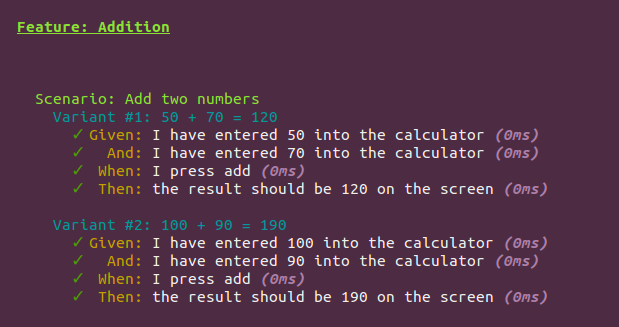
Variants
Manual & Skipped
var dataset = [
{ manual: true, desc: '50 + 70 = 120', num1: 50, num2: 70, result: 120 },
{ skip: true, desc: '100 + 90 = 190', num1: 100, num2: 90, result: 190 }
];

Bug monitoring
Minor bugs
They are not executed and count as passed
feature('Addition', function() {
scenario('Add two numbers', function() {
given('I have entered 50 into the calculator', function() { });
and('I have entered 70 into the calculator', function() { });
when('I press add', function() { });
then('the result should be 120 on the screen', function() { });
}).minorBug('bug12345');
});
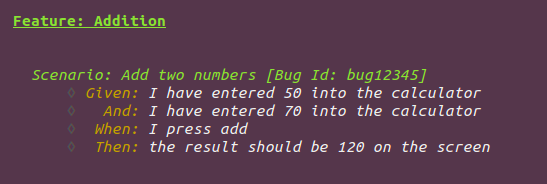
Bug monitoring
Major bugs
They are executed and count as failed
feature('Addition', function() {
scenario('Add two numbers', function() {
given('I have entered 50 into the calculator', function() { });
and('I have entered 70 into the calculator', function() { });
when('I press add', function() { });
then('the result should be 120 on the screen', function() { });
}).majorBug('bug12345');
});

Bug monitoring
Variants
var dataset = [
{ minorBug: 'bug12345', desc: '50 + 70 = 120', num1: 50, num2: 70, result: 120 },
{ majorBug: 'bug54321', desc: '100 + 90 = 190', num1: 100, num2: 90, result: 190 }
];
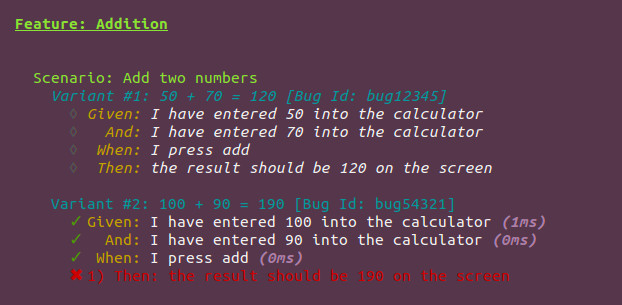
Bug monitoring
Links
On markdown reports, bug ids will be links
if the --bugid-link parameter is provided.
$ tartare --reporter gherkin-md --bugid-link "http://bugtrackingsystem/%s" --recursive ./acceptance
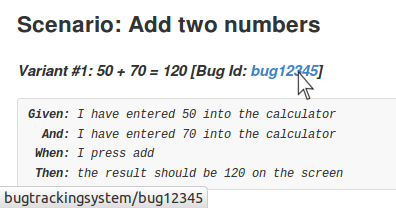
Tags
Tagging features/scenarios/variants
feature('Addition', function() {
var dataset = [
{ tag: 'tag4', desc: '50 + 70 = 120', num1: 50, num2: 70, result: 120 },
{ tag: 'tag5', desc: '100 + 90 = 190', num1: 100, num2: 90, result: 190 }
];
scenario('Add two numbers', dataset, function(variant) { }).tag('tag2');
scenario('Add two negative numbers', function() { }).tag('tag3', 'tagA');
}).tag('tag1');
Tags
Filtering test execution
# Run tests having tag4 and tag3
$ tartare --reporter gherkin --filter "+tag4,+tag3" --recursive ./acceptance
# Run tests having tag2 and not having tag5
$ tartare --reporter gherkin --filter "+tag2,-tag5" --recursive ./acceptance
# Run tests having tag2 or tagA
$ tartare --reporter gherkin --filter "+tag2|-tagA" --recursive ./acceptance
# Run tests having tag4 or having tag3 and tagA
$ tartare --reporter gherkin --filter "+tag4|(+tag3&+tagA)" --recursive ./acceptance
'manual' and 'bug' are reserved tags that are set by Tartare when using the
.manual modifier or minorBug/majorBug methods.
Before / After hooks
var dataset = [
{ desc: '50 + 70 = 120', num1: 50, num2: 70, result: 120 },
{ desc: '100 + 90 = 190', num1: 100, num2: 90, result: 190 },
];
feature('Addition', function() {
scenario('Add two numbers', dataset, function(variant) {
beforeEachVariant(function() {
clearScreen();
});
given('I have entered ' + variant.num1 + ' into the calculator', function() { });
and('I have entered ' + variant.num2 + ' into the calculator', function() { });
when('I press add', function() { });
then('the result should be ' + variant.result + ' on the screen', function() { });
});
});
Before / After hooks
feature('Addition', function() {
beforeFeature(function() {
switchOnCalculator();
});
scenario('Add two numbers', function() {
given('I have entered 50 into the calculator', function() { });
and('I have entered 70 into the calculator', function() { });
when('I press add', function() { });
then('the result should be 120 on the screen', function() { });
});
});
Sync vs Async
Node.js code is essentially asynchronous
Though many tests look better using synchronous code
Sync code
Writing sync code is straightforward
scenario('Add two numbers', function() {
given('I have entered 50 into the calculator', function() {
num1 = 50;
});
and('I have entered 70 into the calculator', function() { });
when('I press add', function() { });
then('the result should be 120 on the screen', function() { });
});
Converting Async into Sync
This module has steps implementation (using async code)
var fs = require('fs');
module.exports = {
readConf: function readConf(cb) {
fs.readFile('config.json', function(err, data) {
if (err) {
return cb(err);
}
cb(null, JSON.parse(data));
});
}
};
Converting Async into Sync
Without Tartare
var steps = require('./steps');
describe('Configuration', function() {
describe('Read configuration', function() {
var config = null;
[...]
it('I read the config file', function(done) {
steps.readConf(function(err, cfg) {
config = cfg;
done();
});
});
[...]
});
});
Converting Async into Sync
Now we can use async functions as if it were sync
var tartare = require('tartare');
var steps = require('./steps');
tartare.synchronize(steps);
feature('Configuration', function() {
scenario('Read configuration', function() {
var config = null;
[...]
when('I read the config file', function() {
config = steps.readConf();
});
[...]
});
});
What if I need to use async code?
- Add a callback (usually named
done) to the step keyword - Invoke that callback when you test is complete
var tartare = require('tartare');
var steps = require('./steps');
feature('Configuration', function() {
scenario('Read configuration', function() {
var config = null;
[...]
when('I read the config file', function(done) {
steps.readConf(function(err, cfg) {
config = cfg;
done();
});
});
[...]
});
});
It also works with before and after hooks
Only
You can use the .only version
of feature and scenario keywords
feature.only('Addition', function() {
scenario.only('Add two numbers', function() {
[...]
});
});
It also works with variants including
the field only set to a truthy value
var dataset = [
{ only: true, desc: '50 + 70 = 120', num1: 50, num2: 70, result: 120 },
{ desc: '100 + 90 = 190', num1: 100, num2: 90, result: 190 },
];
TARTARE AS A QA LIBRARY
Chai Plugins
Chai is a BDD assertion library that can be
paired with Mocha (and Tartare) and can be
extended with our own assertions
expect('test').to.be.a('string');
expect([1,2,3]).to.include(2);
expect(var).to.be.null;
expect([]).to.be.empty;
expect('foo').to.have.length.above(2);
expect(7).to.be.within(5,10);
expect({ foo: 1, bar: 2 }).to.have.keys(['foo', 'bar']);
Tartare Chai Plugins
HTTP Chai plugins
expect(req).to.have.httpMethod('POST');
expect(res).to.have.httpStatusCode(200);
expect(res).to.have.httpHeaders(['content-type', 'x-forwarded-for']);
expect(req).to.have.httpHeaders({
'content-type': 'application/json',
'x-forwarded-for': '127.0.0.1'
}]);
expect(req).to.have.httpBody(expectedBody);
expect(res).to.be.httpChunked;
expect(res).to.have.httpCharset('utf-8');
Tartare Chai Plugins
UNICA Chai plugins
expect(res).to.be.a.wellFormedJsonApiResponse;
expect(res).to.be.a.wellFormedXMLApiResponse;
expect(res).to.be.a.wellFormedSoap11ApiResponse;
expect(res).to.be.a.jsonApiError(404, 'SVC1001');
expect(res).to.be.an.xmlApiError(404, 'SVC1001', 'v1');
Collections
An HTTP REST client to make easier testing REST APIs
Let's have an API in http://someserver.com/provision/v1 with the following CRUD resources:
- apps
- developers
- products
Collections
Creating an API client based on Tartare collections
var collections = require('tartare').collections;
var provisionApi = collections.createCollectionsGroup({
baseUrl: 'http://someserver.com/provision/v1'
});
var applications = provisionApi.createCollection('apps/');
applications.get({ id: '1d1272b3-2bde-470a-8925-0bbd74a8516f' }, function(err, res) {
if (err) {
console.log(err);
} else if (res.statusCode !== 200) {
console.log('ERROR trying to read an application:', res.statusCode, res.body)));
} else {
console.log(JSON.parse(res.body));
}
});
API mock
A mock server ready to behave as an API server
Start the mock
$ <tartare_root>/bin/apimockserver --admin-port 8080 -port 8000
- admin-port: port used to configure mock behaviour
- port: port where the mock expects service requests
It also supports HTTPS and 2waySSL modes
API mock
Configuring the mock
POST /admin/v1 HTTP/1.1
Host: server.com
Content-Type: application/json
Content-Length: 126
{
"method": "GET",
"path": "/provision/v1/apps/1d1272b3-2bde-470a-8925-0bbd74a8516f",
"response": {
"statusCode": 200,
"headers": {
"Content-Type": "application/json",
"Unica-Correlator": "{{{headers.unica-correlator}}}"
},
"body": "[Application details]",
"delay": 200,
"chunked": true
}
}
API mock
Asking for the last request for a pair method-path
GET /admin/v1/lastrequests?method=GET HTTP/1.1
Host: server.com
HTTP/1.1 200 OK
Content-Type: application/json
Content-Length: 126
[
{
"method": "GET",
"requestUri": "/provision/v1/apps/1d1272b3-2bde-470a-8925-0bbd74a8516f",
"path": "/provision/v1/apps/1d1272b3-2bde-470a-8925-0bbd74a8516f",
"query": null,
"headers": {
"Host": "server.com"
"Unica-Correlator": "13cf5c4f-3670-46e1-9b7f-931c8ef17236"
},
"charset": null,
"chunked": false,
"connection": { "remoteAddress": "192.168.0.101, "remotePort": 11487 },
"body": ""
}
]
API mock
ApiMockAdminClient: making easier mock configuration
var mockAdminClient = tartare.apiMockAdminClient.createClient('localhost', 8080);
mockAdminClient.configs.create({
method: 'GET',
path: '/provision/v1/apps/1d1272b3-2bde-470a-8925-0bbd74a8516f',
response: {
statusCode: 200,
headers: {
'Content-Type': 'application/json',
'Unica-Correlator': '{{{headers.unica-correlator}}}'
},
body: JSON.stringify(myApp),
delay: 200,
chunked: true
}
}, function(err, res) {
});
Server utils
A set of functions to manage servers
configuration, start and stop
- renderConfigFile: create config files from a mustache template and a config object.
- [start|stop]Server: start/stop any server. Starting a server is synchronous and it can wait for the to start by timeout, or looking for a string in the stdout/stderr.
- killServersByTpcPorts: Kill all processes listening to the given ports (supports RHEL, Ubuntu and OSX).
- [start|stop]ApiMockServer: start/stop the API Mock.
Server utils
renderConfigFile
Config Template
"server": {
"address": "{{{serverCfg.address}}}",
"port": {{{serverCfg.port}}}
}
Config Object
var serverCfg = {
address: 'myserver.com',
port: 8080
}
Resulting Config
"server": {
"address": "myserver.com",
"port": 8080
}
Native Types Extensions
'string'.startsWith('str'); // => true
'string'.endsWith('ing'); // => true
'copyme'.repeat(5); // => 'copymecopymecopymecopymecopyme'
RegExp.escape('^\(a+)*/$'); // => '\\^\\(a\\+\\)\\*\\/\\$'